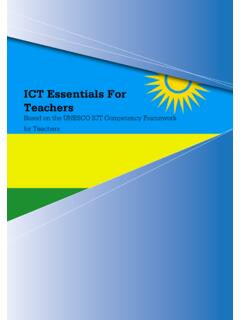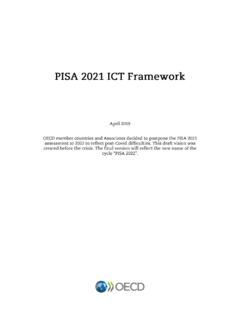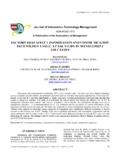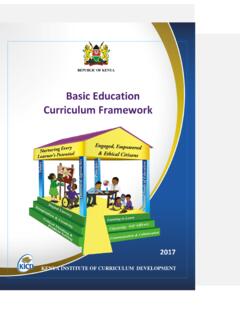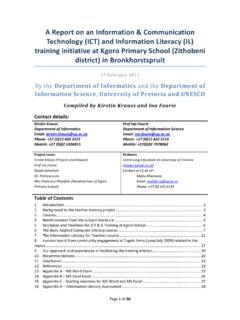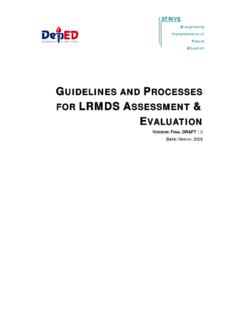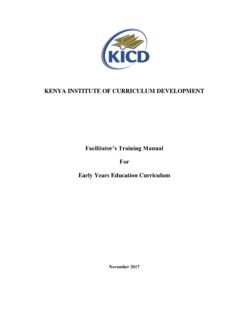Transcription of ICT COMPETENCY STANDARDS FOR TEACHERS
1 POLICY framework . ICT COMPETENCY STANDARDS FOR TEACHERS . Policy framework ICT COMPETENCY STANDARDS FOR TEACHERS . Published in 2008. by the United Nations Educational, Scientific and Cultural Organization 7, place de Fontenoy, 75352 PARIS 07 SP. Composed and printed in the workshops of METIA. UNESCO 2008. These materials may be reproduced, translated, distributed or displayed for non-commercial purposes, provided that you give attribution to UNESCO. Printed in the United Kingdom CI-2007/WS/21. POLICY framework . Foreword To live, learn, and work successfully in an increasingly complex, information-rich and knowledge- based society, students and TEACHERS must utilize technology effectively.
2 Within a sound educational setting, technology can enable students to become: Capable information technology users Information seekers, analyzers, and evaluators Problem solvers and decision makers Creative and effective users of productivity tools Communicators, collaborators, publishers, and producers Informed, responsible, and contributing citizens Through the ongoing and effective use of technology in the schooling process, students have the opportunity to acquire important technology capabilities. The key individual in helping students develop those capabilities is the classroom teacher . The teacher is responsible for establishing the classroom environment and preparing the learning opportunities that facilitate students' use of technology to learn, and communicate.
3 Consequently, it is critical that all classroom TEACHERS are prepared to provide their students with these opportunities. Both professional development programs for TEACHERS currently in the classroom and programs for preparing future TEACHERS should provide technology-rich experiences throughout all aspects of the training. STANDARDS and resources within UNESCO's project ICT COMPETENCY STANDARDS for TEACHERS . (ICT-CST) provide guidelines for all TEACHERS , specifically for planning teacher education programs and training offerings that will prepare them to play an essential role in producing technology- capable students. Today's classroom TEACHERS need to be prepared to provide technology-supported learning opportunities for their students.
4 Being prepared to use technology and knowing how that technology can support student learning have become integral skills in every teacher 's professional repertoire. TEACHERS need to be prepared to empower students with the advantages technology can bring. Schools and classrooms, both real and virtual, must have TEACHERS who are equipped with technology resources and skills and who can effectively teach the necessary subject matter content while incorporating technology concepts and skills. Interactive computer simulations, digital and open educational resources, and sophisticated data-gathering and analysis tools are only a few of the resources that enable TEACHERS to provide previously unimaginable opportunities for conceptual understanding.
5 Traditional educational practices no longer provide prospective TEACHERS with all the necessary skills for teaching students to survive economically in today's workplace. 1. ICT COMPETENCY STANDARDS FOR TEACHERS . Foreword cont'd Through the ICT-CST project, UNESCO is responding to: (a) its function as a standard-setting agency, (b) its mandate within the Education for All (EFA) Programme, (c) its mandate as the lead agency for action lines C4 on capacity building (with UNDP) and C7 on e-learning as decided by the Geneva Plan of Action adopted by WSIS1 (2003) and (d) to its overarching objective of building inclusive knowledge societies through communication and information.
6 The ICT-CST project provides a complete framework for ICT COMPETENCY STANDARDS for TEACHERS by (a) addressing the underlying Policy framework (document 1 of 3), (b) examining the components of educational reform and developing a matrix of skill sets for TEACHERS which correspond to various policy approaches and education reform components2 (document 2 of 3), and (c) providing a detailed description of the specific skills to be acquired by TEACHERS within each skill set/module3. (document 3 of 3). The second phase of the ICT-CST project involves the establishment of a UNESCO mechanism to endorse training programs for compliance with the UNESCO STANDARDS . The complete guidelines for submission, evaluation and endorsement will be published on the UNESCO website dedicated to this project: Furthermore, UNESCO will map existing teacher training STANDARDS and training programs to the ICT- CST matrix of skill sets in an attempt to streamline the global efforts in this general area.
7 We do hope that this work will contribute to the development of appropriate training programs for ICT skills of TEACHERS with a global recognition. Finally, it is important to note that the development of the UNESCO ICT-CST has been a true example of the power of strategic public-private partnerships for development. We are pleased to acknowledge the outstanding support of our numerous partners in both academia and the IT private sector. Most notably, we would like to express our gratitude to Microsoft, Intel, Cisco, the International Society for Technology in Education (ISTE) and the Virginia Polytechnic Institute and State University (Virginia Tech). Their contributions are greatly appreciated.
8 Abdul Waheed Khan Assistant Director-General for Communication and Information UNESCO. 1. W. SIS stands for the World Summit on the Information Society which was held in two phases. The first phase took place in Geneva from 10 to 12 December 2003 and the second phase took place in Tunis, from 16 to 18 November 2005. Check http://. for more details. 2. Such a matrix is referred to as the COMPETENCY STANDARDS Modules . 3. Such description is included in the Implementation Guidelines document. It is important to note that this document is a dynamically evolving set of guidelines which will be continuously updated and posted on the website COMPETENCY - STANDARDS - TEACHERS to reflect technology evolution on the teaching/learning processes.
9 2. POLICY framework . Acknowledgements UNESCO Partners Abdul Waheed Khan (Cisco, Intel, ISTE, Microsoft). Armelle Arrou Alethea Lodge-Clarke Elizabeth Longworth Claudia Toth Caroline Pontefract Don Knezek Cedric Wachholz Frank McCosker George Haddad Jim Wynn Jean-Claude Dauphin Julie Clugage Mariana Patru Lizzie Range Miriam Nisbet Lynn Nolan Ren Cluzel Mark East Tarek Shawki Martina Roth Yong-Nam Kim Michelle Selinger Paul Hengeveld Robert Kozma Wendy Hawkins Reviewers Abdel Elah Al-Ayyoub Hugh Jagger Alan Bennett John Couch Alex Wong Johnson Nkuuhe Allan Jolliffe Khalid Touqan Ammar Alhusaini Kilemi Mwiria Andrea Karpati Mostafa Naserddin Astrid Dufborg Nancy Law Barbara Lockee Niki Davis Chirs Dede Ola Erstad Chris Morley Osama Mimi Claude Luttgens Oskar Sandholt
10 Cristian Cox Pascal Cagni Diogo Vasconcelos Paul Nicholson Doug Brown Pornpun Waitayangkoon Ellie Meleisea Rita Ellul Gabriel Accascina Ronald Owsten Gordon Shukwit Soon Fook Fong Hala Lattouf Theo Teeder Herve Marche Tim Unwin Hoda Baraka Yosri El-Gamal All names are listed alphabetically by first name. Please contact Mr Tarek Shawki (Project Director) at for further information. 3. ICT COMPETENCY STANDARDS FOR TEACHERS . 4. POLICY framework . Introduction This paper explains the rationale, the structure, and the approach of the ICT COMPETENCY STANDARDS for TEACHERS (ICT-CST) project. It explains how teacher professional development fits into the larger education reform context, as countries review their educational systems in relation to producing 21st century skills in support of social and economic development.










